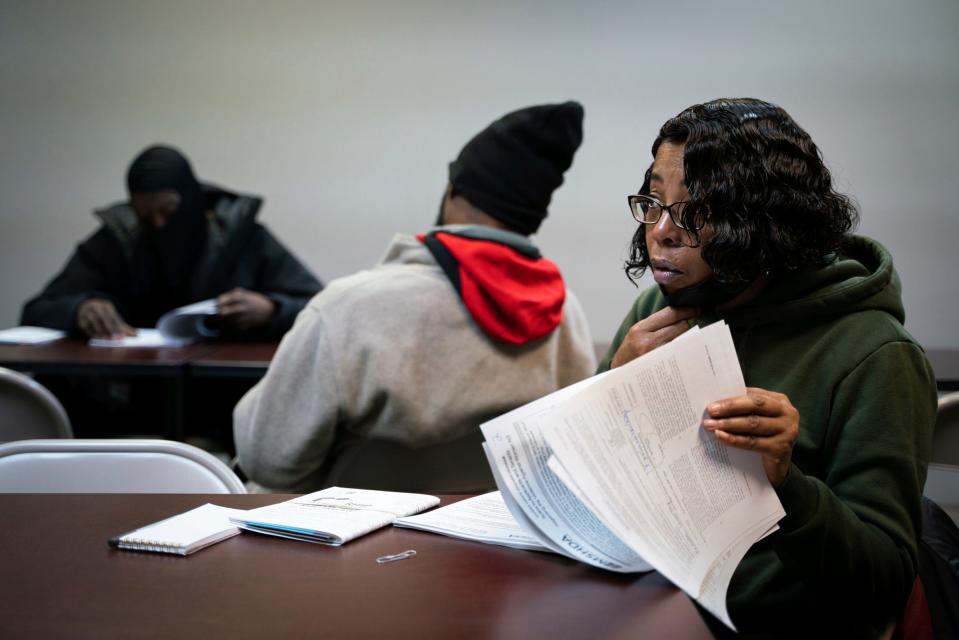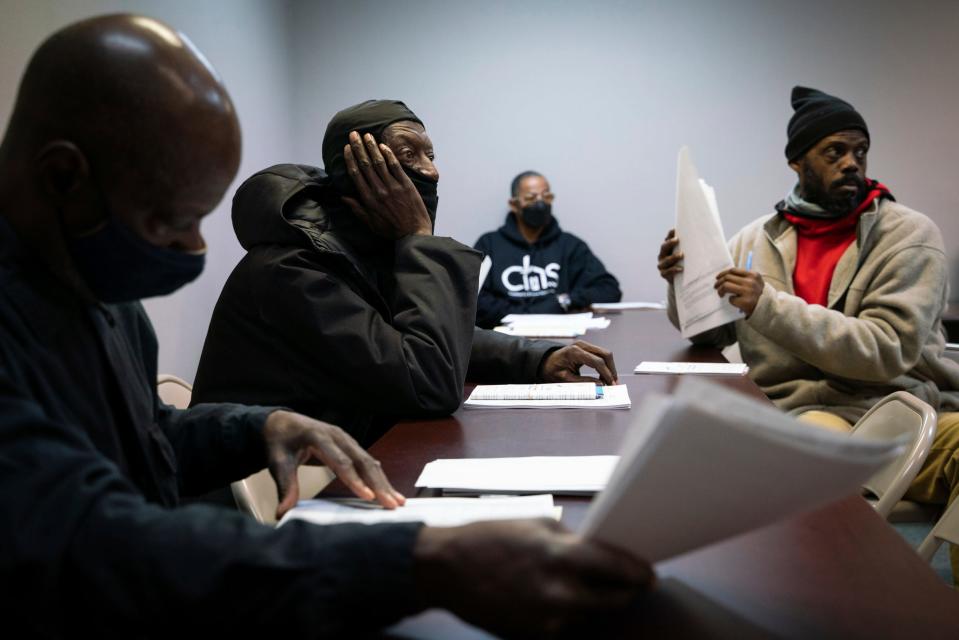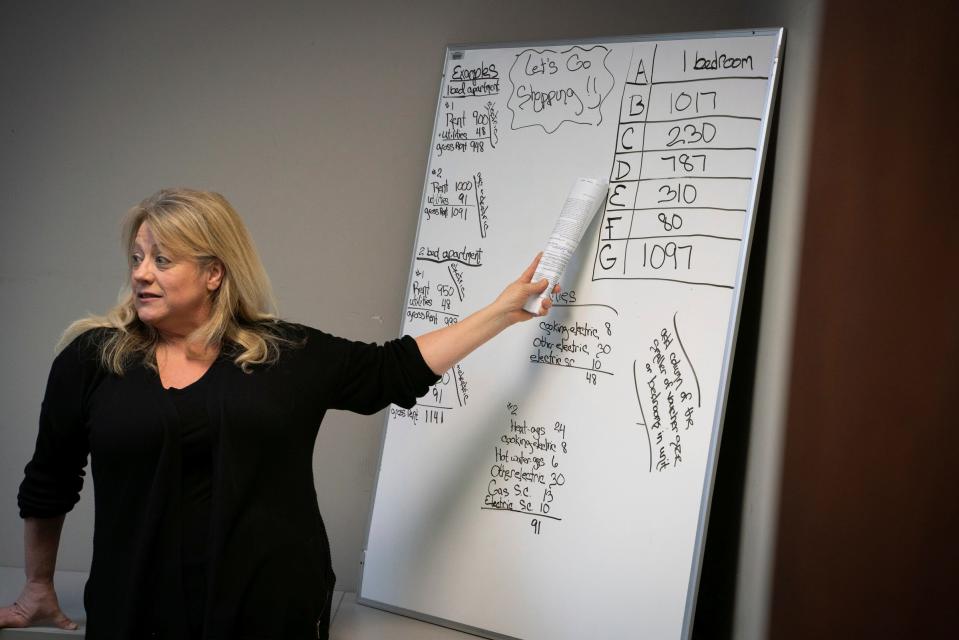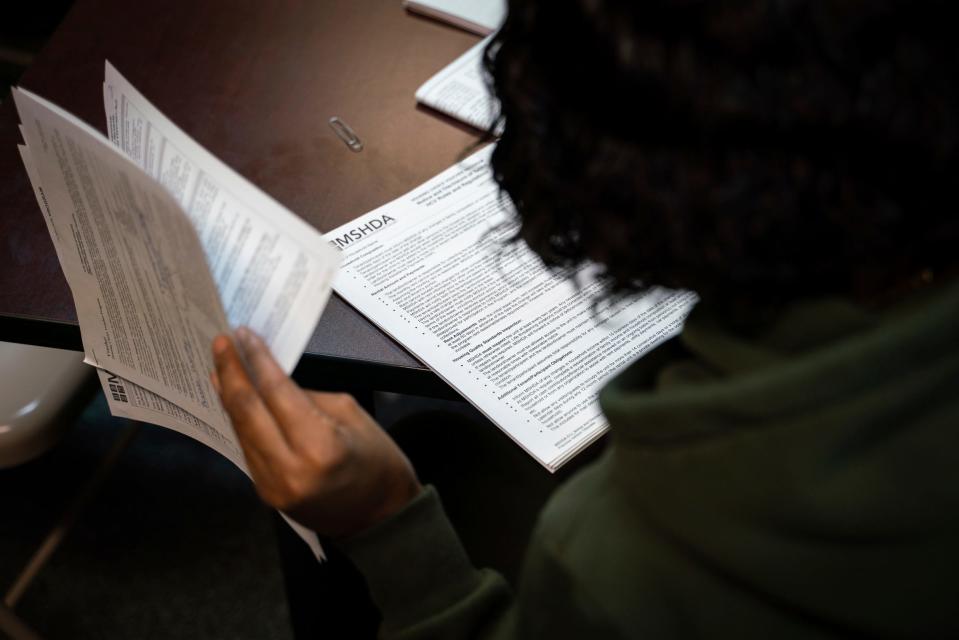Voucher program can help low-income Michigan families get housing — but using it isn't easy
For Rocale Worthy, the journey to find a home has been a waiting game.
Worthy became homeless last April after her landlord sold the house she was renting without notice. She moved into a shelter and applied for a federal housing voucher, for the first time, to help her afford a place of her own.
"I just want a home ... something stable," said Worthy, 53, of Detroit. She has been out of work since October.
Worthy was overjoyed to finally have her voucher in hand on Jan. 20. She had just 60 days to find a home.

Among the rentals she visited, one didn't have a porch, only bricks and trash scattered about in its place. Another house was boarded-up. Rent has gone up because of inflation, making many options unaffordable.
But Worthy remained hopeful. In January, she applied for a two-bedroom house in Detroit. With her deadline looming, she scoured rental websites and looked at other homes in case the one she wanted fell through.Last week, less than two weeks before her time was up, her inspection was approved.
"I've just been patient and praying. (It's) stressful at times, but when you see the light at the end of the tunnel, then I just know it's gonna get better," she said.
Worthy signed her new lease Thursday.
More:Michigan housing authority opens voucher waiting list for 61 counties: How program works
More:Resources available for Detroit taxpayers to avoid foreclosure: What to know
More:Detroit's eviction defense office will offer free legal help. Here's what to know.
She was among those at the top of the waiting list for a housing voucher because she is experiencing homelessness. Even then, Worthy waited about eight months to receive her voucher, and nearly two months to sign a lease to a home. Other low-income families may spend years in limbo.
After applying, the average wait to receive a housing voucher is about two years, with one local housing agency saying the wait can stretch to five years. Only a fraction of eligible families across the country get a housing voucher. Meanwhile, thousands of Michiganders languish on waiting lists hoping to be among the fortunate chosen to receive the subsidy when vouchers become available.
Experts say the federal housing program, a key tool to lift families out of poverty, can be complex and inaccessible to the families who need it most.
"One of the biggest challenges is that there is a massive shortage of vouchers, so most families that need one never actually get one," said Julie Cassidy, a senior policy analyst at the Michigan League for Public Policy. "Those that do, usually spend several years on the waiting list first and when they finally get the voucher, they have a really hard time finding a landlord who will accept it."

Some landlords, meanwhile, struggle with long inspection periods and hurdles in being paid, deterring their participation. Families, providers say, may have a hard time navigating the lengthy, complicated process of getting a voucher and finding landlords willing to rent to them. The nonprofit Community and Home Supports received $579,187 in federal funding through the city of Detroit to help families experiencing homelessness successfully use their voucher through the year.
"It's an extremely complex process to navigate and we can only imagine if you don't have a phone, or don't know where you're going to sleep at night, or don't have a place to receive your mail, or don't have a laptop or a smartphone or a fax machine, how difficult it would be to navigate this on your own," said Matthew Tommelein, coordinated entry program manager for Community and Home Supports.
Long waitlists and a complicated process
The U.S. Department of Housing and Urban Development's housing choice voucher program, which housing agencies across the country administer, is lauded as a tool to help low-income families put a roof over their heads that they otherwise couldn’t afford.
It allows tenants to find units in the private market. Public housing agencies then pay landlords directly and eligible families are responsible for paying 30% to 40% of their monthly income on rent and utilities and the subsidy pays the rest.
Typically, housing is deemed affordable when costs, including utilities for renters, don't exceed 30% of a household's monthly income.
Families usually have 60 days to find a place, a timeline that the housing agency can extend.
In Michigan, there are 65 such agencies, according to HUD. The Free Press reached out to several housing authorities throughout the state to explain how the program works and the challenges families encounter in the voucher process.
All of the agencies had waitlists and most were lengthy.
The Detroit Housing Commission last opened its housing choice voucher program in February 2020. In three days, 22,000 applications poured in. Then a computerized lottery randomly selected 7,000 people to place on a waiting list.
Nearly 1,800 were deemed eligible. As of last month, not all of them had successfully leased up. Nearly 500 people were still looking for housing and the waiting list had 4,200 applicants.
"Depending on where they are in the list, in the lottery, they could be waiting two to five years," said Sandra Henriquez, chief executive officer of the Detroit Housing Commission.

The Michigan State Housing Development Authority (MSHDA), the state's largest voucher holder, has more than 74,000 households on its waiting list. In 2021, about 20,000 people applied and the year after, that increased to roughly 34,000. Those families were added to a running waiting list
MSHDA currently assists about 28,000 families who hold vouchers.
The Ferndale Housing Commission, which covers Wayne, Oakland and Macomb counties, last opened up its waiting list in 2018. Five thousand applications came in and 700 were randomly selected for the waitlist. There is a 250-person waiting list now and it can take up to two to three years to get pulled.
The numbers illustrate the overwhelming need for affordable housing across the state. Agencies responsible for handling vouchers say that demand for housing far outweighs supply.
The Ferndale Housing Commission is spending more on units as rental costs rise and there is not a lot of turnover, officials said. Generally, new vouchers are issued as people come off the program.
One in four households eligible for rent aid receive it because of funding limitations, according to the Center on Budget and Policy Priorities, which analyzed HUD data. In Michigan, the average wait time for vouchers was about two years — on par with the national average.
“HUD is committed to ensuring people have access to the resources and tools they need to get a decent and safe home in Michigan and throughout the nation,” a HUD spokesperson said in an email. “Two of several efforts HUD is working on toward this include a 2023 agency strategic goal to use 100% of the annual budget authority for the housing voucher program, as well as HUD’s creation of forecasting tools to assist PHAs (public housing agencies) with tracking usage, projections, utilization rates, etc., to help contribute to successful leasing conditions.”
Battling misconceptions around vouchers
Some housing agencies say families with vouchers struggle to find landlords willing to rent to them. The Poverty and Race Research Action Council tracks laws across the country that prohibit housing discrimination based on source of income, such as federal subsidies. Nine Michigan cities, including Ann Arbor, East Lansing and Grand Rapids, have such policies in place.
In Detroit, City Council President Mary Sheffield requested the council’s legislative policy division look into the legality of an ordinance preventing rental discrimination based on income. The Legislative Policy Division, in a February report, said Detroit city code prohibits rental discrimination based on “public benefit status,” which means a person who receives government benefits such as food assistance, Medicaid or other subsidies. It does not specify housing vouchers.
The city of Detroit’s Civil Rights, Inclusion and Opportunity Department is responsible for compliance with this part of the city code. The report said council could amend the code to make protections more comprehensive and specific.
"There's definitely some stigma attached to the label of voucher holder — that these are not going to be good tenants, that they aren't going to treat the property well," said Jim Schaafsma, a housing attorney with the Michigan Poverty Law Program.
These misconceptions, paired with concerns around red tape, may deter landlords from participating in the program, he said.

The Fair Housing Center of Metropolitan Detroit received 212 complaints related to housing discrimination from October 2021 to September 2022, according to Executive Director Steve Tomkowiak. Source of income complaints increased to the third most common fair housing complaint, after disability and race.
In 2021, the Oakland County Board of Commissioners passed a resolution encouraging cities to adopt source of income protections. Since then, Ferndale, Hazel Park, Oak Park, Royal Oak Township all passed ordinances, said Commissioner Charlie Cavell, who represents a portion of southeast Oakland County and spearheaded the effort.
Though the push to protect voucher holders from discrimination is gaining traction at the local level, advocates say statewide action is necessary.
"A statewide law protecting renter families from this kind of discrimination would create a more fair and inclusive rental market," Cassidy said. "It would increase the number of affordable homes available to families with vouchers and also ensure that those homes are spread more equitably throughout communities."
Lawmakers in 2021 introduced bills to prevent landlords from denying housing based on source of income, including vouchers, but the proposals did not make it far. Now, some lawmakers want to bring the issue back to the forefront.
Lawmakers in the Michigan House last month introduced a pair of bills to protect renters from discrimination based on their income source, including housing assistance.
Federal law does not require landlords to accept housing vouchers.
A HUD spokesperson said the department is working with public housing agencies to reach out to landlords to help them understand the program and guidelines.
“Fair housing law covers race, color, national origin, religion, sex (including gender identity and sexual orientation), familial status and disability. HUD’s Office of Fair Housing and Equal Opportunity is dedicated to eliminating housing discrimination, promoting economic opportunity, and achieving diverse, inclusive communities by enforcing, administering, developing and increasing the public understanding of federal fair housing policies and laws,” according to a statement.
Landlords face challenges in voucher program, too
Landlords also struggle to navigate the housing choice voucher program, making some reluctant to participate. Lengthy inspection timelines and delays are a big hurdle for landlords, said Douglas Marcum, regional property manager at KMG Prestige.
For regular leases, tenants can move in in a matter of days, he said, but for voucher recipients, landlords have to wait until after an inspection, which can take three to four weeks. Inspections may fail for cosmetic reasons like touch-up paint jobs, Marcum said, further hindering the process and timely rent payments.
"Businesses have payment requirements on when they have to pay the utilities, when they have to pay their mortgage payments, debt service, things like that," he said. "Landlords are no different."
But once landlords understand how the program works, it's guaranteed rental income, Marcum said, and that can be a safety net.
"During all of the shutdowns and everything for COVID, we were still receiving those subsidy payments," he said.
The reason his company participates in the program, he said, is to help house individuals who may not otherwise have a home. Though his organization may understand the ins and outs of the program, other property owners with fewer resources may not, Marcum said.
"We fully support voluntary participation and strongly oppose any effort to mandate participation until improvements and or reform of the voucher program has been completed," said Marcum, who represents the Detroit Metropolitan Apartment Association and the Property Management Association of Michigan.
To improve the program, Marcum said more inspectors could help address long delays, and it would help if landlords themselves could verify that they addressed cosmetic items instead of having to go through additional inspections for those issues.
As agencies work through wait lists, a shortage of affordable housing and bureaucratic red tape, the federal voucher program is expanding across the country.
In September, HUD announced more than 19,000 new housing choice vouchers across the country at nearly 2,000 public housing agencies, touted as the "most expansive allocation of flexible new rental assistance in 20 years," according to a news release.
Michigan received about $4.4 million for 511 housing choice vouchers.
Last month, HUD announced $315 million in grants for people experiencing homelessness in unsheltered settings and in rural areas. Michigan received more than $1.8 million in grants and additional vouchers were expected.
Resources
People interested in applying for a voucher should contact their local housing agency to ask about open wait lists and for more information. Go to https://bit.ly/MichiganHousingAgencies or call the HUD rental programs line at 800-955-2232.
Voucher holders who believe they are facing discrimination can file a complaint online or call HUD’s housing discrimination hotline at 800-669-9777.
Nushrat Rahman covers issues related to economic mobility for the Detroit Free Press and BridgeDetroit as a corps member with Report for America, an initiative of The GroundTruth Project. Make a tax-deductible contribution to support her work at bit.ly/freepRFA.
Contact Nushrat: nrahman@freepress.com; 313-348-7558. Follow her on Twitter: @NushratR.
This article originally appeared on Detroit Free Press: Michigan housing program waiting list has thousands of people on it

